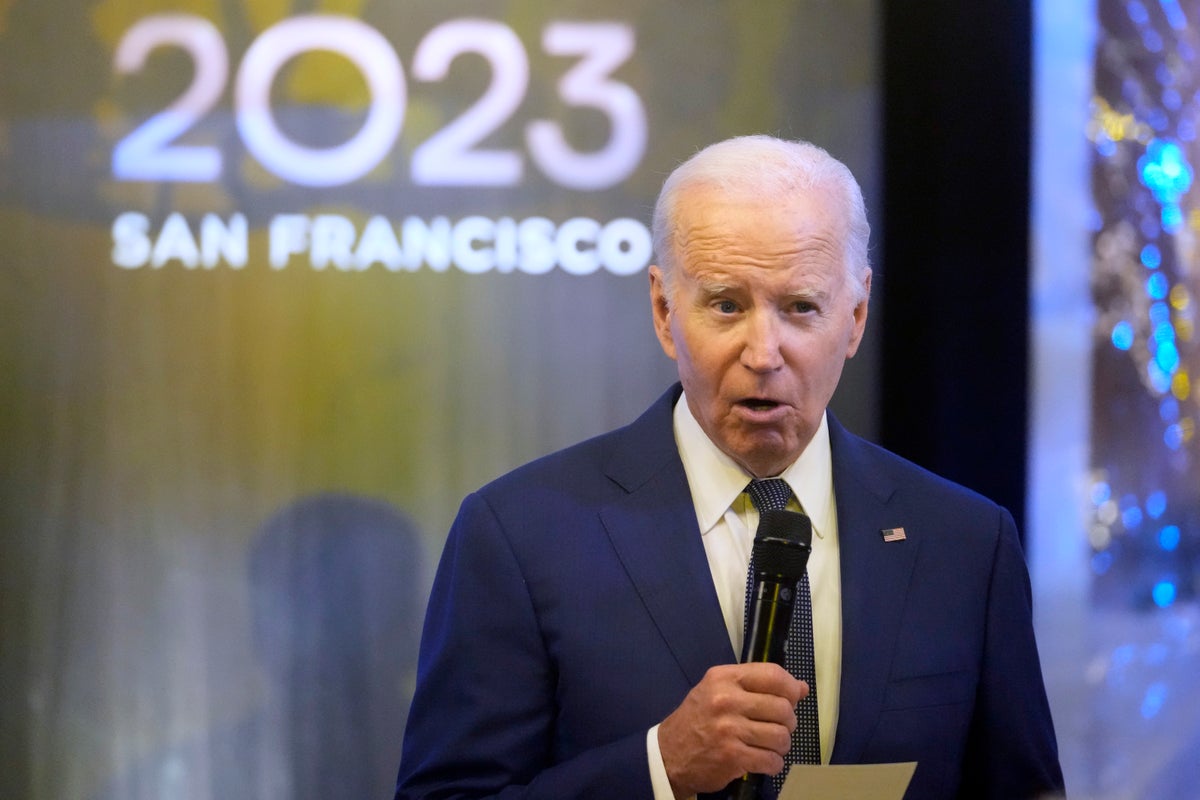
President Joe Biden has now signed the stopgap funding bill, averting a government shutdown and pushing the battle over US spending on Ukraine and Israel into the new year.
In a statement, the White House confirmed that the president signed the bill on Thursday, during this week’s visit to San Francisco to host the Asian-Pacific Economic Cooperation summit and to hold a high-stakes meeting with Chinese President Xi Jinping.
HR 6363, or the “Further Continuing Appropriations and Other Extensions Act, 2024” – pushed by newly-elected House Speaker Mike Johnson – will now keep the government and federal agencies open through to 19 January 2024 for continuing projects and activities funded in four appropriations bills.
Other government entities will be funded up to 2 February.
A US official flew the bill from Washington DC for Mr Biden to sign while hosting an APEC Summit dinner at the Legion of Honor Museum in California on Thursday night, The Associated Press reported.
His signature came just hours before the US government was set to run out of funds on Friday night.
It came after the House and the Senate both passed the stopgap bill this week, bringing some semblance of calm to a chaotic period in Congress – while also teeing up major fights about spending bills in the coming year.
On Wednesday, the US Senate overwhelmingly passed the stopgap spending bill, with all but one Democrat supporting the bill while 10 Republicans opposed it. The House of Representatives passed the bill on Tuesday evening.
“Hopefully it's a good sign, but keep in mind, we've got two deadlines now that we have to deal with,” Sen Thom Tillis (R-NC) told The Independent after the Senate vote.
Sen Jon Tester (D-MT), the chairman of the Senate Veterans Affairs Committee who is running for re-election next year, said he was happy Congress avoided a government shutdown.
“That's a good news,” he told The Independent. “Bad news is we should have got this work done the end of September.”
House Republicans hope to use that approach to avert passing an “omnibus” spending bill wherein all 12 major spending bills are combined into one, which they believe prevents spending cuts.
But senators on both sides of the aisle expressed scepticism that spending bills could actually pass and the upcoming the spending fights.
President Joe Biden speaking at the APEC Summit event— (AP)
“I'm disappointed that after we'd pass the first three-bill package, we didn't immediately go into the next package,” Sen Susan Collins (R-ME), the top Republican on the Senate Approriations Committee, told The Independent. “I think had what you believe would have finished that package at the end of last week and been on the next package.”
Sen Joe Manchin (D-WV), who last week announced his retirement from the Senate, told The Independent that he was worried about the inability to pass future spending bills.
“I sure hope so, but it doesn’t look good,” he said.
Sen Raphael Warnock (D-GA) also told The Independent that he did not like the process.
“I wish we weren’t here,” he said. “I wish that Congress could find a way to do his job. I think this politics of chaos and brinksmanship is bad for the American economy overall.”
Mr Warnock pointed to the fact that Fitch downgraded the country’s credit rating.
“But here we are,” he said. “We're gonna be the adults in the room keep the government open while we negotiate something.”
Multiple issues remain unresolved though. The continuing resolution contains no aid for Ukraine or Israel, which were top priorities for Democrats.
“We need supplemental funding that covers Israel, Ukraine, humanitarian relief, security at home for mosques, and synagogues,” Sen Elizabeth Warren (D-MA). “And we need money for childcare. We've got a complete collapse in the system. So there's work to be done.”
A sign of how pressing aid is was the fact that family members of Israeli hostages held by Hamas were at the Senate ahead of the final vote Wednesday evening.
“I'm very hopeful because there's clearly an overwhelming bipartisan majority in favour of aid, Ukraine, aid to Israel, aid to Taiwan,” Sen Richard Blumenthal (D-CT) told The Independent. “If it’s given a vote, it will pass.”
It is unclear whether even under the two new deadlines, Congress can pass legislation to keep the government open.
“I have no idea,” Sen Mitt Romney (R-UT) told The Independent. “It’s a good development on the part of the House and Senate got the job done as well. So very positive.”
The passage of the bill caps off a marathon 10 weeks of Congress that included the passage of a continuing resolution, the ouster of former speaker Kevin McCarthy, 22 days wherein Republicans could not nominate a speaker, the subsequent ascent of Mr Johnson and the passage of the continuing resolution.
Toward the end of the week, tensions rode high, with Sen Markwayne Mullin nearly coming to fisticuffs during one hearing. Though some levity came on Wednesday as actor and former WWE wrestler Dwayne “The Rock” Johnson appeared on Capitol Hill to discuss military recruitment.
But on Wednesday evening, senators seemed eager to leave the Hill for the Thanksgiving Holiday. Sen Chuck Grassley, whom at 90 is the oldest and longest serving Senator, reflected the exhaustion.
“It’s 11 O’clock, I’m going to bed,” he said.






